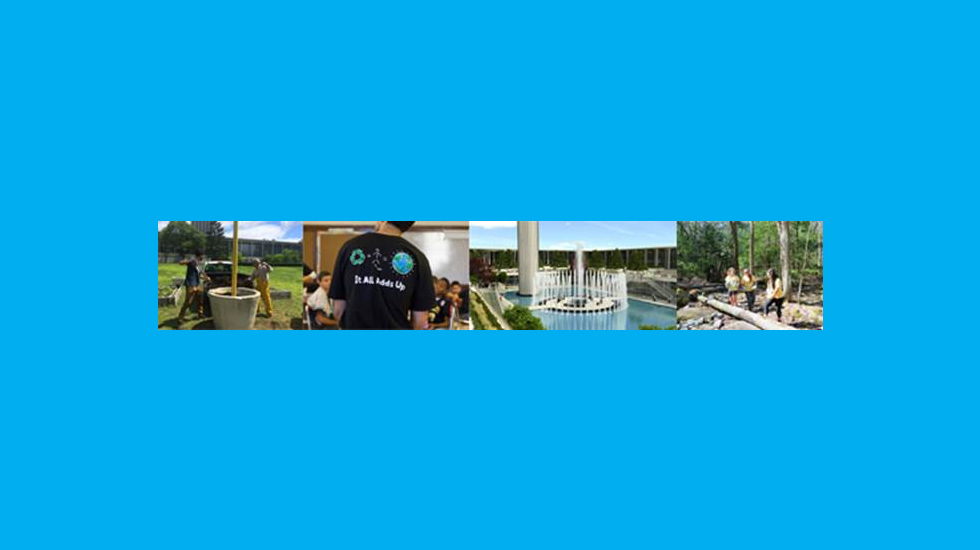New York Campus Life Sustainability Education Roundtable
Save the date for the 3rd Annual Campus Life Sustainability Education Roundtable on Saturday, November 7, 2015. We invite students, faculty, and staff to come UAlbany to share ideas, network with other student leaders, and discuss programs that engaged students in campus-based experiential sustainability learning opportunities. The day will feature hands-on workshops and info sessions to transform you into a stronger campus change agent. Sponsored by New York Coalition for Sustainability in Higher Education.
Who Should Attend?
Any current student leader or striving leader! The Roundtable will provide leadership development opportunities for students involved in building more sustainable campuses, whether you’re in Residential Life or a student group. Staff and faculty advisers will have the chance to converse about solutions they found and challenges they face while building a campus culture of sustainability.
Where can I sign up?
Register today on EventBrite. Please email Mary Alexis Leciejewski at gogreen@albany.edu with any questions.
Call for Student Proposals
Students are invited to submit abstracts to present on either a Peer to Peer Education Program or a Leadership Skill. Please submit proposals using this form.
Peer to Peer Education Program
Abstracts should be clear and concise, and no more than 500 words. Please include details of the program, and how it teaches about one or more of the key elements of sustainability: economy, environment, and community. If accepted, the student will present the program for a group of up to 30 students. The presentation should be 15-20 minutes, excluding time for questions. Please note that you are responsible for supplying materials needed.
Example Program Abstract: Make Your Own Lip Balm
I will present a program that teaches about the potential environmental harm from everyday items we buy, while empowering the audience members to create their own alternative and make smart purchasing choices. I will first give a brief overview of some of the hazards of our everyday beauty merchandise. For example, I will explain that personal care products are manufactured with 10,500 unique chemical ingredients, some of which are known or suspected carcinogens, toxic to the reproductive system or known to disrupt the endocrine system. Though some companies make products that are safe to eat, others choose to use dangerous ingredients like coal tar and formaldehyde, both human carcinogens. We will also discuss how these dangerous ingredients then enter our ecosystems. Lastly, I will then answer any questions about the industry, to the best of my knowledge. Then, I present a hands-on activity on how to create your own lip balm using organic, nontoxic ingredients. Each student will make a lip balm to take home from three ingredients: coconut oil, shea butter, and beeswax. We will discuss benefits of DIY personal care products. Finally, to empower the students to be more mindful of the products they purchase, I will introduce the students to “Skin Deep,” a smartphone app created by the Environmental Working Group that you can use to scan a product’s bar code to learn if any of the ingredients are harmful.
Sustainability Elements:
Environment- Students will have a deeper understanding of how their consumer behavior impacts our ecosystems.
Community– This program will have a strong emphasis on the effects that an industry can have on personal health.
Leadership Presentation
Students are invited to submit abstracts for a 30-minute presentation on key leadership skills that are essential for building a sustainability movement on campus. Students are asked to focus on one or two leadership topics, using examples from their own campus and sustainability leadership experience. Each presentation should offer insight on how to grow and maintain a student movement on campus, either through a sustainability group or in residential life. The presentation will also give each student the opportunity to highlight campus sustainability advancements (or challenges!). Abstracts should be clear and concise, and no more than 500 words. Please include details of the program, and how it teaches a key leadership. Topics can include, but are not limited to:
- Delegation effectiveness
- Student group transition management
- Event planning
- Motivation of student group membership
- Marketing
- Student group recruitment
- Interacting with Campus Administration
- Collaboration with other student organizations
Example Program Abstract: Growing Green at UAlbany
I will discuss how a group of students strategically aligned our goal of establishing our garden to assuage concerns of administration. In fall 2013, a cohort of UAlbany students decided it was time for our campus to join the burgeoning campus garden movement sprouting up across the country. In 2009, over 140 campuses reported that they had a garden or farm, widely ranging in size from ¼ acre to over 100 acres. Buzz about the garden began with a series of strategic monthly meetings that culminated in decision to make UAlbany’s garden a little bit different. After researching other campus student gardens and realizing that many flounder and ultimately fall into disrepair, the Grow Green group decided that we wanted to not just build a garden for ourselves. We outlined many goals connected to the missions of various departments across campus. First, we wanted deepen community engagement, one of the tenets of the President’s agenda, by educating the campus and surrounding community on the culture and historical background of Albany. The garden would be a heritage garden, one which honors the natural and cultural heritage of Albany while showcasing environmentally sustainable planting practices. Second, we to create a green space that will provide a release from the stresses of daily life in Albany and provide a community space, a goal that Student Affairs and the Health Center would favor. Finally, we worked to demonstrate environmentally sound gardening. Strategic planning enabled us to present to administrative officials from Campus Planning, Finance and Administration, and the Grounds Department to gain approval to alter the landscape of our campus.

